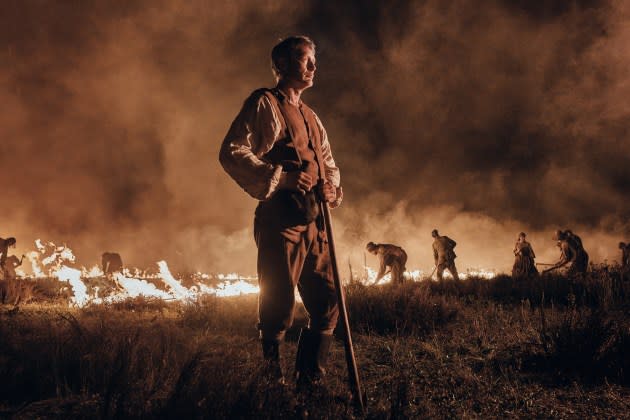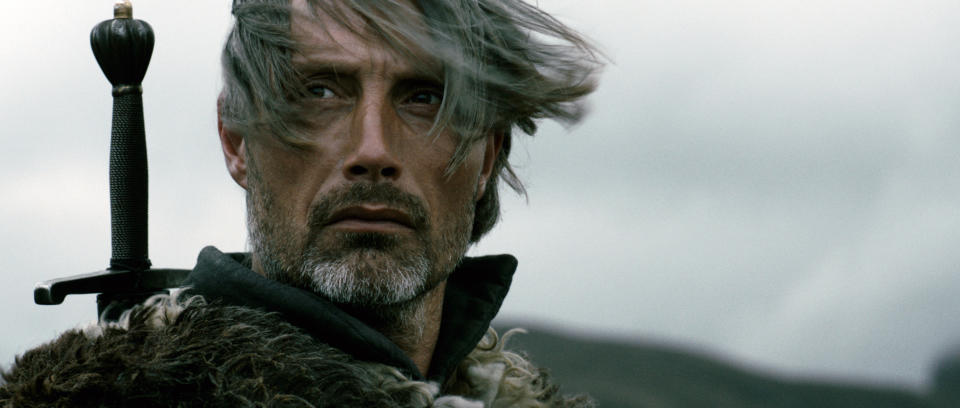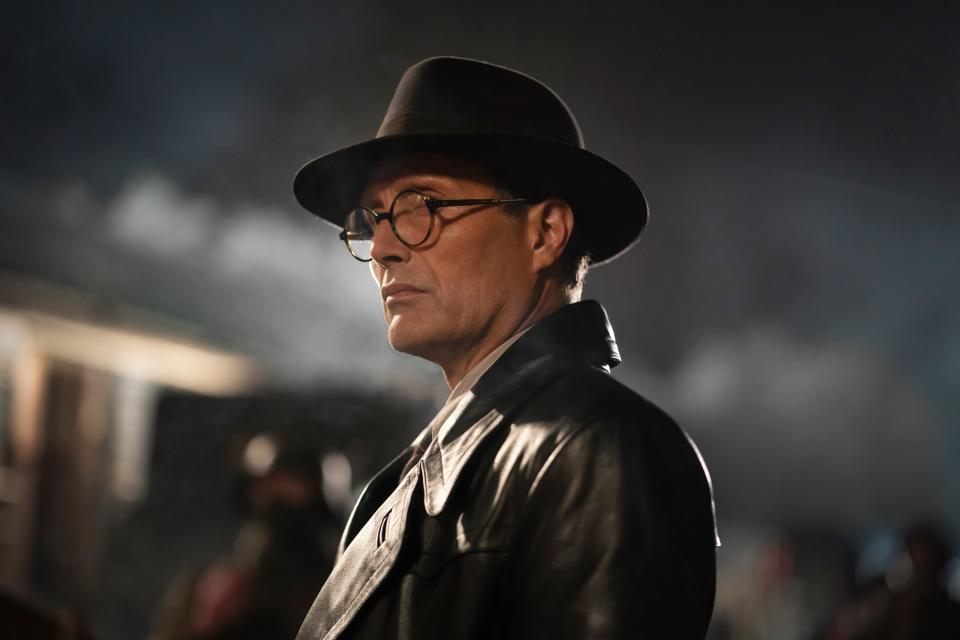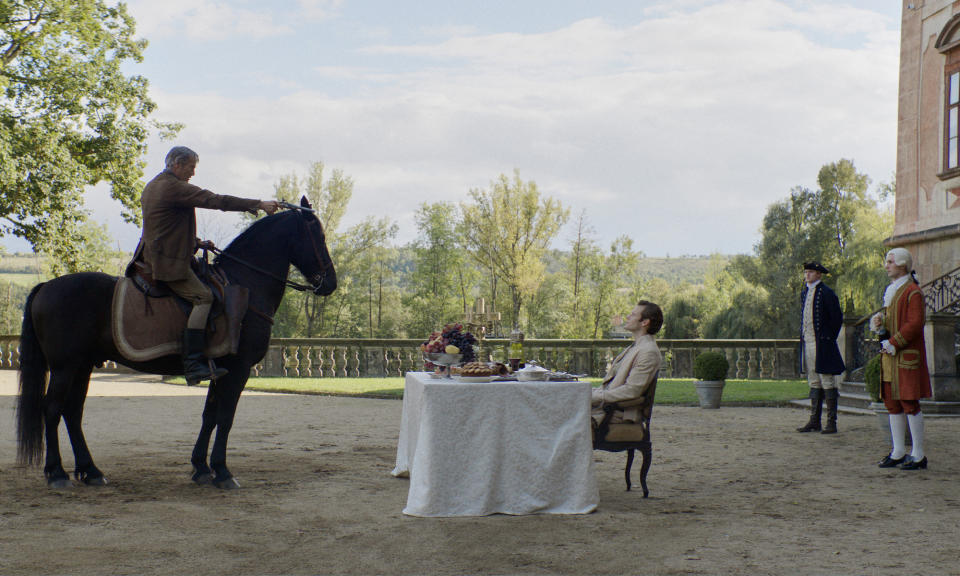Mads Mikkelsen On His International Oscar Contender ‘The Promised Land’, Saying Goodbye to ‘Indiana Jones’ And Becoming A New Grandfather
- Oops!Something went wrong.Please try again later.

As a recent new grandfather, Mads Mikkelsen couldn’t be happier, but he doesn’t smile much in his new movie. An earthy 18th-century period piece, The Promised Land sees the Dane play a hard-up veteran, Ludvig Kahlen, who is determined to turn the blasted heaths of Jutland into a thriving farmland. It’s a Western of sorts, which becomes noticeably clearer when Kahlen starts to cross swords with a competing local landowner, but, for Mikkelsen, it’s a subversive alpha male story of the kind he does so well, from the brutal Viking fantasy Valhalla Rising to the white-cold survival drama Arctic.
In his homeland, the film has a much more blunt title, Bastarden, which drills much further down into the essence of the character. “The literal meaning in English is being the illegitimate son of someone,” the actor explains, “but it also means, obviously, to be an asshole. In Denmark, it’s not so much the former meaning, so I think it’s a very appropriate title.” He shrugs. “But that’s not in our hands, so here we are.”
More from Deadline
That said, Mikkelsen doesn’t judge Kahlen for his behavior. “He has no choice,” he says. “He has to be determined in order to survive.” In this way, the actor sees parallels with his 2013 film Age of Uprising: The Legend of Michael Kohlhaas, in which he played the lead: a vengeful German merchant who ignites a vicious feud with 16th-century Saxony. “I think Michael Kohlhaas has a lot in common,” he says. “It’s obviously a way older story, but the theme is the same: a man who’s shaping his own destiny, who has a sense of righteousness and justice, and he’s willing to burn down the world to get his way.”

As is historically accurate, the finished film makes Jutland look miserable, but Mikkelsen maintains the shoot “was not that bad”, noting that he always had the luxury of a trailer within reach if it started raining too heavily. “I’ve had tougher work,” he says. “Obviously, we had an epic film to shoot, and then 42 days and a budget of $8 million to make it look as good as it does, which meant we always needed to get something in the can. Which meant long days, but it wasn’t the toughest shoot ever. It was actually very satisfying.”
Despite the strike, it’s been a good year for Mikkelsen, now 58. The way timing worked out, you’d think he’d been juggling The Promised Land, a Venice competition title, with his role as Jürgen Voller in Indiana Jones and the Dial of Destiny, which premiered in Cannes some three months before. “Oh, they didn’t overlap at all,” Mikkelsen says. “It just so happened that they came out kind of back-to-back. Indiana Jones was in the editing room for a long time, because so much stuff has to happen with CGI, whereas our film was in the editing room for a much shorter time. They didn’t overlap in the shooting period. In fact, I’ve made it a virtue not to overlap films for a lot of reasons, partly because it’s frustrating, but it also means I have to compromise [on my performance].”
Born in the Copenhagen suburb of Østerbro, Mikkelsen has been in some of the biggest movies the industry can offer, from Bond to Marvel, and yet Indiana Jones affected him more than most. “It’s interesting to make a film that you almost spend as much time doing the PR for as you do shooting it,” he says. “That’s the nature of those big animals from America, especially this one. We were everywhere, and I thoroughly enjoyed it.”
Why did he want to be a part of it? “Indiana Jones?” he says, almost incredulous. “I grew up with it, as did everyone in my generation, way before I started watching French films and falling in love with this category or that genre. Indiana Jones was just a milestone in moviemaking when it comes to adventure films, one of those thoroughly charming films that stays with you forever. That was the first reason. Then sentimental reasons. When I read it, and I realized that it was a goodbye to him, I was like, ‘Damn. I want to be part of this.’ It’s a beautiful ending for this beloved character.”

It was also a long way from the world of Nicolas Winding Refn’s 1996 film Pusher, a debut for them both, in which he played a drug dealer’s sidekick. Did he think his career would take him this far? “God, no. It would have scared me away. I hadn’t graduated when I did the first Pusher film. I was in school. When you graduate, you just hope and dream that you will be part of something that you find interesting, and a lot of things were happening in Danish cinema at that period, and one of them was Nicolas and his Pusher films. I became part of his team, and that was everything I could hope for. Step by step, it changed into something else and, all of a sudden, I landed in America as well. If I had known that, I might have been scared off. I might have just said, ‘Hold your horses.’”
Which would have been cinema’s loss. When did he realize that his career was going international? “Well, the first thing I did was King Arthur,” he says, referring to Antoine Fuqua’s 2004 adventure yarn, in which he appeared with Clive Owen, Keira Knightley and Joel Edgerton. “Then I got the call for James Bond and, obviously, that was a game-changer in the sense that it was the real deal, it was an established franchise, and they wanted me to be not a sidekick but the baddie. I was like, ‘OK. Stuff’s happening.’”
It’s hard to imagine now, but Casino Royale was in no way a sure thing. By the end of Daniel Craig’s tenure as 007, audiences were begging him to stay, but at the start of that tenure he was on a hiding to nothing. “Yeah,” Mikkelsen says. “The irony of that is, obviously, insane. It’s hard for us to imagine that now. I mean, James Bond is the crown jewel of English cinema history, in many ways, so, obviously, people are going to have strong opinions of what the next Bond is going to look like.
“There was a pressure on all of us, but on Daniel it was much more so, because there was not one day he would walk down the street — before we even shot a scene — and not see a headline saying he sucked, he was blonde, or his nose was wrong, or whatever. Everything was wrong. If that was pressure on me, he must have felt it a thousand times more. Then he showed them, and we were all high-fiving each other. We knew it was going to be a good one, but it was better than that. It was fantastic to be part of.”
Since then, Mikkelsen has popped up in quite a lot of these kinds of big movies: Star Wars prequel Rogue One, Harry Potter sequel Fantastic Beasts and Marvel’s Doctor Strange (“Magic and flying kung fu — who am I to turn that down?”). What’s it like being part of a huge franchise? Does a cool Danish temperament come in handy?

“I realized quite early that everybody is quite human on a film set,” he says. “For example, you meet Daniel Craig, who is about to be the new Bond and he’s also shivering in his pants, because it is what it is, but he’s also an actor, so he comes from the same background as me. He does his best, and he tries to focus and make the experience an intimate experience, by which I mean, yes, it’s a big film, but we need to take it down.”
These international films have been a godsend, however. “Denmark is a small country,” he says. “If you make one film a year, people get really fed up with you. One film a year is two month’s work, right? Obviously, you can’t live from that.” Nevertheless, as The Promised Land shows, Mikkelsen does still like to work at home, and, despite all his big-budget studio work, the scene that will follow him forever is the dance he does at the end of Thomas Vinterberg’s bittersweet 2020 International Oscar-winner Another Round. “I’m so happy that Thomas prevailed,” he says, “because I kept insisting on not having that part of the film in there. I wanted a different kind of ending.”
Seriously? “I didn’t like the idea of dancing. I thought it was wrong, I thought it was pretentious. It was a realistic film, and I just couldn’t fathom how we would shove that into a realistic film. He tried to persuade me in so many ways, and he ended up just saying, “Listen, I’m the director. Shut up.” I was like, “OK. Fair enough. Let’s do it.” He was so right. It is the most beautiful ending of any film I’ve been in, and, as you say, it’s got a life of its own. Boy, was I wrong and I’m glad that he insisted.”
As for the future, Mikkelsen doesn’t have a bucket list; he says he just makes the most of every opportunity that comes to him. “I don’t have a little Hamlet in me,” he grins. It is, however, “no secret” that Martin Scorsese is one of his biggest heroes.
Have they met? “A few times. He’s wonderful. Absolutely wonderful. I promised myself not to talk about Taxi Driver. Then, after a couple of beers, I recited the monologue in the film, the whole thing, which I learned when I was, I don’t know, 20-something. I knew I was making the biggest fool out of myself, and I’m sure he’s heard it a million times, but I couldn’t help myself.” He laughs. “I just love that monologue.”

But whether or not Scorsese ever does call (“He’s got my phone number”), Mikkelsen is pretty happy with his lot, especially in a year when most of his peers were unable to work. “I was super-lucky,” he says. “Obviously, the Danish film I was promoting did not get affected by that — even though I’m SAG, they made an exception for some foreign films — and then I did an American indie film in Budapest, and they greenlit that one too. They didn’t want to kill the entire industry, so they greenlit quite a few indie films, and I was lucky to be part of one of those.”
The film he made in Budapest is called Dust Bunny, and it marks the directing debut of Bryan Fuller, creator of Pushing Daisies and a prolific genre writer. Mikkelsen describes it as “a family horror movie”, which marks yet another departure for him. “It’s a really charming story,” he says. “Bryan’s brain is operating on a different level than the rest of us, but it’s very sweet, if you can say that about Bryan’s stuff. It’s a very sweet, funny and kind of grotesque story about a little girl, a grownup man, and a monster under the bed.”
Right now, though, there’s nothing in the calendar. “I don’t mind having a break,” he says. “I’ve been quite busy being a new granddad, so I’ll cherish the rest of the year doing as little as possible.”
Best of Deadline
2023 Premiere Dates For New & Returning Series On Broadcast, Cable & Streaming
2023-24 Awards Season Calendar - Dates For Oscars, Emmys, Grammys, Tonys, Guilds & More
Da'Vine Joy Randolph To Receive Palm Springs Film Festival's Breakthrough Performance Award
Sign up for Deadline's Newsletter. For the latest news, follow us on Facebook, Twitter, and Instagram.

